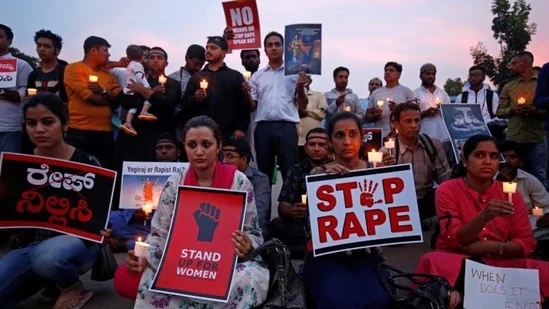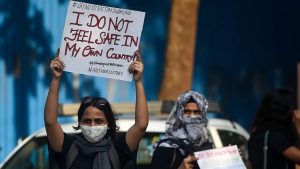Why Delhi Cannot Celebrate Its Declining Gender Crime Numbers Yet

Here are some critical data-points on crimes against women in Delhi for the year 2020 from the Crime in India report by National Crime Records Bureau.
- 997 cases of rape
- 1,840 cases of sexualt assault
- 416 cases of sexual abuse
- 235 cases of stalking
- 110 cases of dowry deaths; 2,557 of cruelty by husband or his relatives, 14 of dowry harassment, and 2 of domestic violence
The capital holds the reputation for being unsafe for women (see here, here, and here), more so in the wake of the 2012 gangrape and murder of a 23-year-old physiotherapy student. However, the NCRB numbers would indicate that not only is Delhi reporting lower crime figures than before but also that it is doing much better than other cities. With a crime rate of 129 cases per 1,00,000 persons, Delhi appears to be much safer than cities such as Lucknow (190), Jaipur(162) and Indore (129) in safety for women.
An analysis of numbers between 2017 and 2020 would show a 24% decline in crimes against women in Delhi – 13,297 to 10,093. But do these numbers indicate a dramatic shift in the city’s safety record for women?
Gender safety and urban mobility experts who have been doing extensive work in Delhi say they are sceptical about the official numbers. The dip in crime rate is not so much an indicator of declining crimes but of how citizen-friendly the police department is, said Supreet, director and CEO of Red Dot Foundation, a not-for-profit working at the intersection of gender, technology, communications, data and urban planning.
The biggest reason for the fall in numbers could be the massive underreporting of crimes despite multiple state initiatives, said activists. Underreporting can be attributed to various reasons including police’s unwillingness to file a First Information Report (FIR), poor awareness of legal processes and the trivialisation or even normalisation of the crime.
BehanBox reached out to Delhi Police for comments. We will update the article when we get a response.
History of gender violence
In the 1980s, Delhi had witnessed a massive spate of dowry deaths, with young women being set on fire and their deaths passed off as suicide or accidents. Experts at the time attributed this to negligence and apathy of law-enforcing agencies.
Between 2001 and 2018, Delhi witnessed a 70.7% increase in the rate of all rape-related crimes, according to a study by Public Health Foundation of India. Almost a 56% increase in the reporting of these crimes was seen following the Nirbhaya gang-rape incident, as per the study. Delhi alone witnessed a 148% rise in the crime rate following 2012 but the numbers plateaued after 2015.
“The increased reporting of the crime which was driven by more awareness and promise of faster and effective justice saw a steep fall after a few years due to lack of actual improvements and implementation of promises by the government,” the report stated on the reporting trends in Delhi.
In the aftermath of the 2012 gangrape, the government introduced changes to various laws, policies and initiatives to ensure that rape convicts are prosectured more effectively and swiftly. In the immediate aftermath of the case, the Criminal Law (Amendment) Act, 2013, was introduced. Several offenses such as stalking, acid attacks, voyeurism, and sexual harassment were brought into the ambit of law; the definition of rape was amended; the age of being tried as an adult for violent crimes was reduced to 16; and the minimum sentence for a person charged for rape was changed from seven years to ten years.
However, these have not been implemented effectively, showed a 2017 report by Human Rights Watch. The Nirbhaya fund to support initiatives protecting the dignity and ensuring safety of women in India remains underutilised. More than half (51%) of the allocated 6,212 crore rupees allocated during FY22 remains unutilised, according to the latest data shared by the Ministry of Women and Child Development in Rajya Sabha.
‘Too common to be a crime’
The margin of underreporting is especially high for sexual crimes and harassment in public spaces, said Sonali Vyas, the programme head at Safetipin, an organisation focussed on safe and inclusive public spaces. “The police has a tendency to overlook cases of sexual harassment on streets as they do not consider it serious enough to register an FIR,” she explained. Stalking and related crimes are a prime example of all these issues.
Only 1% of victims report sexual violence because of patriarchal attitudes that place the emotional responsibility of such crimes on women, stated the PHFI report. “When a girl or a woman decides to report harassment, the family discourages her. They feel that the family name will be maligned and that the survivor will be shamed. As a result, societies and families start curtailing the rights of women and girls. Such attitudes further discourage women from reporting sexual crimes,” said Supreet.
In serious sexual offenses like rape, almost 95% of the offenders in Delhi in 2020 were known to the survivors, as per the NCRB data. But sexual harassment, which occurs more frequently and is more prevalent among strangers, hardly gets reported.
Of the women who had experienced sexual harassment in public spaces and not reported it to the police, 65% cited the frequent occurrence of such cases as reason for not reporting it, found a 2019 report titled “Women and Mobility” by Safetipin. Other reasons for not reporting a crime included lack of trust and faith in the police, being afraid of the police and police inaction, the report said.
“In cases like stalking and voyeurism which are generally considered as the less heinous crimes against women but occur more frequently, the tendency to register such crimes both by the survivor as well as the police is lax. For example, in Delhi in 2020, the total number of cases registered of stalking were 235, which seems like a very small number compared to the incidents that happen in everyday life,” said Supreet.
Another problem, she said, is that people are not aware of the full cover of gender laws. For instance, staring at women and girls and making lewd comments are punishable offences but the practice is so widespread that few even know that these qualify as crimes. “So regardless of how seamless the laws or systems to report a crime are, if people do not know they can avail these services, the system will not work,” she said.
Further the system is not equipped with the sensitivity to deal with the survivor, Supreet added, pointing to the fact that survivors have to relive the crime several times over when they report it.
Delayed justice
Chargesheets were filed in only 75% cases of crimes against women in Delhi in 2020, according to NCRB data. Further investigation was pending in almost 57% of these cases. As many as 98% of the cases of crimes against women were pending trial in Delhi, as of 2020 – a six point rise in the pendency percentage since 2017.
“Our judiciary can take anywhere between two to seven years to deliver a judgement; which means that a survivor has to relive the harassment every day for seven years. Across the criminal justice system, the survivor is discouraged from seeking redressal at every stage,” said Supreet.
Various gaps in the NCRB data make it an unreliable source to assess the extent of crimes against women: for instance, it does not offer specific details about time, place and context.
The NCRB has also adopted the Principal Offence Rule – which means that each criminal incident is recorded as one crime, she further explained. “If many offences are registered in a single FIR case, only the most heinous crime, that is the one that attracts maximum punishment, will be considered as a counting unit. This rule results in discrepancies in the actual number of the incident to cases registered of the incident,” said Supreet.
Not only do the gaps in data fail to evaluate the ground reality, they impede the police’s ability to function effectively. “The lack of geographical precision does not allow for the crimes to be plotted on a map. This prevents the state authorities from introducing holistic policies and taking action to combat gender-based violence,” said Vyas
The SafeCity app by Red Dot Foundation allows its users to anonymously post their experiences of sexual violence. It collects data like the location and the time of the incident among others. “In cities where the police has made use of our data, the police has been able to align patrolling shifts and locations to those that witness a high number of cases of violence against women,” said Supreet.
Lack of awareness
Despite multiple state-run initiatives to encourage reporting of gender-based violence, the number of reported cases has decreased, although anecdotal evidence suggests that crimes have increased, say experts. In 2015, Delhi Police launched Himmat, a mobile safety application, that allowed users to send distress alarms to the police.
“However, it has been found that not many women have even downloaded the app; nor is it known if a single case has gone to the police through the app. A major reason thereof is the lack of awareness among the target population,” said Supreet.
While the centralised cybercrime portal is an initiative that allows users to file complaints online without having to physically visit a police station, experts believe that it is not being used as efficiently owing to people’s lack of awareness.
The one-stop centres set up under the Nirbhaya fund aimed at providing integrated services including medico-legal assistance, counselling and police assistance have failed to function effectively owing to lack of resources and awareness.
We believe everyone deserves equal access to accurate news. Support from our readers enables us to keep our journalism open and free for everyone, all over the world.




